|
DEPARTMENT OF THE INTERIOR
Conservation in the Department of the Interior |

|
CHAPTER XI
CONTINENTAL CONSERVATION
OUR forefathers landed upon a great continent the future development of which was far beyond their most fantastic dreams. For a century or more they huddled together in certain chosen areas and developed a simple but satisfactory rural life. Most of the industries developed were domestic or local. With the increase in numbers that followed a high birth rate and continual immigration, they gradually extended their range over the vast expanses of the continent.
The successive waves of settlers that went down our rivers, over our plains and mountains, and eventually along our railroads carried with them little but their courage and experience. In general the conquest of our share of this continent has been of an amateurish character. This was inevitable, since science had not developed to its present state, the efficiency of government was not great, and the job of living was such an intense one that each man had to concentrate upon it in order to make a success. If we had had full information as to the natural advantages of each new area, if we had known and understood the analysis of soils, if we had had our present quality of seeds and animal stocks, a much more satisfactory result could have been accomplished.
Primarily the aim of our people was to spread over the continent a blanket of farms, each maintaining a family. The land settlement laws, such as the homestead act and others, were all directed to this purpose. In favored localities this has worked out well, but as the population pressed westward into semiarid countries it failed for the most part except in the favored valleys. If we could go back to-day and plan for the wisest location of our people upon this continent, would we not have spared the great forests which were cut down in the Atlantic and some of the Great Lake States and have hurried our people through to the Great Plains?
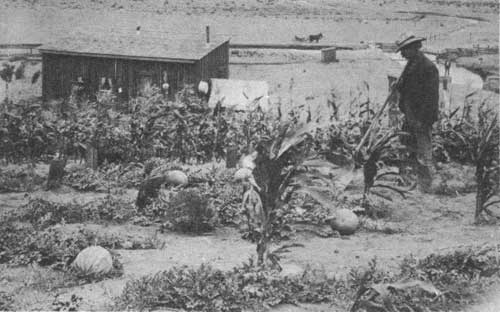
|
| The Homesteader's First Crop on the Plains |
For the most part trees were the greatest antagonists of the settler. The battle against the trees was the battle of many of the pioneers. To-day we are conscious that trees are the only suitable plants for many of the thin-soiled areas that have been cultivated almost to their destruction. The contest between the new land and the old has been a constant factor in American agricultural and economic life and is still going on in various phases in our country as well as in others. In the taking over of new land, its first values were harvested as promptly as possible, and then it was for the most part driven to the maximum of production for a considerable period.
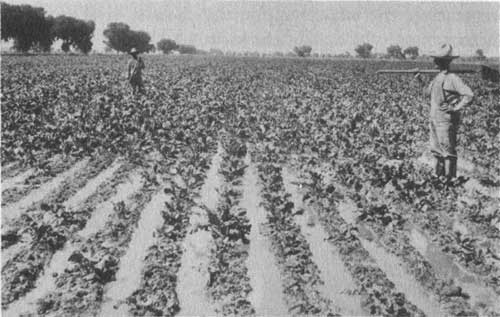
|
| With Irrigation the Pioneer Transformed the Desert |
Gradually, with the shifts and changes and with the development of a more intelligent understanding of the fundamental problems, we have been acquiring new conceptions of continental conservation. Conservation is a term around which much confusion has reigned. Conservation means wise use. Wise use means that a natural asset shall be used for the proper purpose and at the right time. Conservation does not mean the hoarding of natural resources for a hazy, indefinite future. It does, though, mean intelligent and thoughtful planning for every resource of our continent.
The usual action of the Federal Government has been to distribute land resources into private hands as fairly and rapidly as possible. Certain artificial conceptions, such as that of the acre, have been used in dividing up our continent just as we have divided up our cities into town lots of arbitrary size and shape. This has been done largely regardless of the quality of the soil, the amount of vegetation, the water supply, the climate, or those other factors upon which all of the values of the soil, in so far as the habitation of human beings is concerned, depend.
The result of this has been that there has been a large marginal failure in almost every zone throughout the country. In the best areas of the Middle West this process has not been so evident, but throughout the Rocky Mountain region and the Western States the tragic skeletons of abandoned homes tell the gaunt and heartless story of human hardship and of a contest with nature doomed to failure. Purely artificial procedures and arbitrary decisions are not apt to fit well unless all the conditions are favorable. This whole sad process of failure could have been avoided if we had understood the problems of spreading a great population over a continent for successful living. In this process we have recklessly harvested such readily available resources as the forests. We have thought only of their evident use and have failed to see their significance in protecting watersheds and their profound relationship to life in the valleys. Only recently as a people have we sensed the value of our river systems and our water supplies in general.
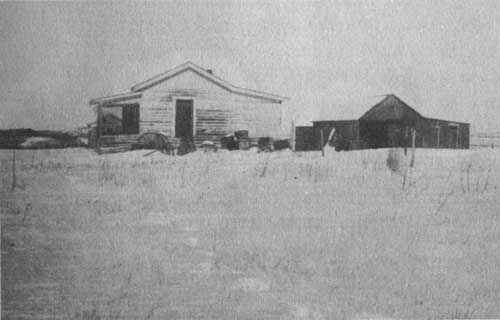
|
| Abandoned Homesteads Mark Many a Tragic Failure |
Some years ago it became evident that our loss in trees would seriously handicap us for lumber. Large portions of the conifer-bearing mountainsides had been unsuited for homesteading and human habitation in general, so that they had remained in the possession of the Federal Government. The great national-forest system was wisely set aside to be retained as an asset of the people rather than to have distribution into private hands.
Hidden beneath the surface of this land of ours were great stores of coal, oil, natural gas, and minerals of many varieties stored there through the ages. In the more thickly settled portions of the country these rapidly came into the possession of private individuals, who developed them in accordance with existing economic practices and demands. Fortunately immense stores were so distant from the market or so hard to master that they were left intact, although they were subject to entry as mineral claims. Until the Federal leasing act was passed discovery of these resources led to their transfer to private hands.
These mineral resources, while extensive, can never be replaced. Anything that is irreplaceable should be conserved and protected for its fullest use. Some of these mineral resources have been set aside to carry on that prime function of the Central Government—national defense—but some still are held in abeyance ready to be used under one plan or another whenever they are required or can be economically mined and used. Certainly for the control of these great resources some form of national strategy is desirable, and many factors are now operating to bring about better control and one freer from waste in their development.
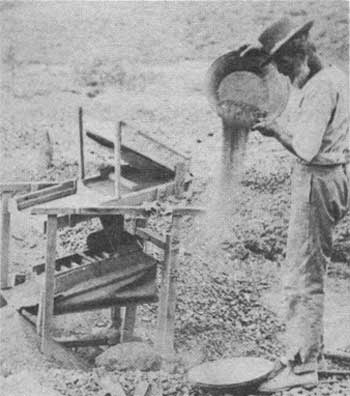
|
| The Prospector Was a Forerunner of Civilization |
The native deserts of the Southwest hold a never-lessening fascination. Aside from their charm there is likely to be a feeling that there lie in them latent possibilities which we are not yet able to grasp. The plant life of the desert, for example, has traveled farther from the waters of the ocean in which all such life is held to have originated than any other. It has solved the riddle of happy existence here on the desert where all else perishes. The barrel cactus, for example, standing out on the arid plain where most plants die, with its abundant inner pulp almost as moist as the heart of a watermelon, is one of nature's most astonishing oddities.
It is not unlikely that there are possibilities in these plants that defy the desert that could be turned to the uses of man. In Hawaii, for example, it is found that the mesquite tree of the deserts has been set to grow and is proving itself of great material value. Under the more favorable conditions of the islands it grows more abundantly and more rapidly. It yields wood for the fires of the Hawaiians. It yields abundant beans which they feed to their livestock. It yields a harvest for honeybees which is being turned to good purpose. In some similar way almost any of these desert plants may come into unexpected usefulness.
The desert itself may come to serve new uses that rise out of its peculiar characteristics. Already it has grown into importance as a region where those who are ill may seek to recover from their misfortunes. We do not know what other purposes it may come to serve. It should be held unmarred in its present condition. The plants that are native to it should remain undisturbed. The lizards, horned toads, road runners, and cactus wrens should be allowed to continue the lives of their fathers. There has been much talk of this sort of conservation and that. Few have spoken for the conservation of the desert. Yet the deserts belong to the Government and should be held unspoiled against the time when their proper utilization may be found.
As we look back we see that our conquest of the continent has been accompanied by many failures and we now often have desolation and shabbiness instead of those wonderful natural conditions built up through centuries of time. We begin to see as we look forward the vague outlines of a future policy which will bring about a more intelligent use of our natural resources and which will restore some of the values we have lost. Trees are being planted, abandoned farms are going back into National and State forests and parks. New conceptions of taxation are appearing. Slowly but gradually we are using each part of the continent in the way that is most profitable. This will be a long and slow process, associated with much human unhappiness and misery; but mistakes are costly and nature is unrelenting in carrying out her own program. Our greatest difficulties in getting the best out of our continent in the future will come from our own actions, from the artificial decisions that we have made or will make regardless of natural conditions.

|
| The Future May Find a Use for This Desert |
There are many misfits between our political units and our geography. There is a great maze of legislation built upon so-called property and human rights which will constantly handicap the necessary changes associated with an increase in population and a rising standard of living. Social elasticity permits a people to meet nature on even terms. Social rigidity is a constant handicap. Life is never static. Our lives and our actions are always in a state of motion, of change, and of flux. Our accommodations to a continent will inevitably take place. If we can see what they should be, we can advance faster. Science has placed a whole series of new tools in the hands of man in dealing with all these questions. Engineering has permitted us to control nature in many ways; organization has given us the chance to unite our financial and other resources in the applications of science and engineering to the problems of life.
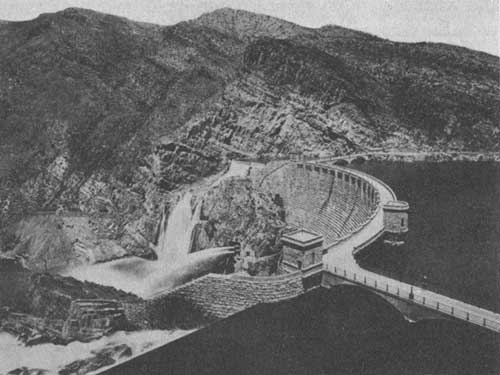
|
| The Engineer Has Given Us Roosevelt Dam, in Arizona, Which Supplies Water for Irrigation and Power for Industry |
If we halt and look about us to see what this is all about and what we are trying to do, we are at once confronted with the fact that in so far as our continent has values it will be those that we as human beings give to it. It is people rather than things that give us our real interest. For tens of millions of years no human eye saw our land. When those early pedestrians crossed the Bering Straits and began that march which eventually led their descendants to Cape Horn of our neighboring continent to the south, they had but little idea of the possibilities of a modern civilization. For them there was sufficient opportunity to secure food and shelter in simple ways. It has been only within a little more than a century that through science and government we have been able to show that exuberant growth which is possible to man when he can use his energy in the presence of abundant natural resources and guide his efforts with a trained mind and with the help of the expert in thousands of fields.
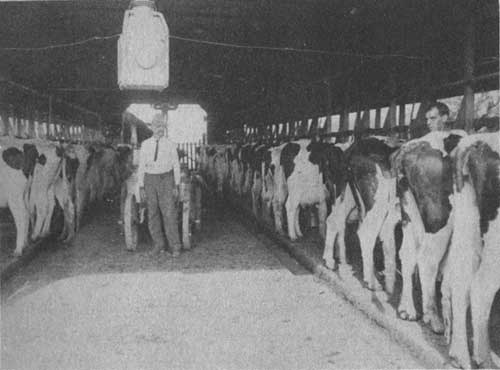
|
| Dairy Barns Have Replaced the Wigwams of the Indian |
Contrast the standard of living of the Indians who resided in Wisconsin a century ago with that of the dairy farmer of to-day. By the use of the trained human mind, the trained hand, and the machine, which is the product of both, we have brought in a whole series of new opportunities for the mind and body of man. A great public educational system is only possible where there is sufficient economic strength so that all of the energy of every capable person is not required to cover the back or fill the stomach. We have made possible new intellectual and spiritual values for every human being. For every one of our citizens, young and old, we have opened great new avenues of happiness. Our active transportation systems have permitted us to become continental minded instead of local and provincial in our concepts and in our thinking; we can enjoy together the many beauties of our continent.

|
| We Need to Get Our Children Back to the Normal Life of the Country |
There has been a great expansion of the mind of America with these developments. If we had proceeded too long without thought and without mobility, we would have found many of our people trying to live upon an ash heap. We are still in danger with soil erosion and other natural processes unless we can conserve for our future certain basic and fundamental elements of our surroundings. Primarily our whole safety as living units depends upon the plant life about us. Controlled plant life has given us our agriculture. The plant life of the past has given us our irreplaceable resources in coal, oil, and gas. These plants working away in the presence of sunshine and water to make food for themselves and for us and our domestic herds are our most valuable material possession. These plants depend entirely upon the rains, the soil, and the sun. Conservation, control, and management of plant life will determine the future of the people of America upon this great continent of ours. Thoughtful conservation and distribution of plants in accordance with our needs and the places where they can produce the most are the fundamental requirements of continental conservation. We can exhaust our stored mineral resources and still survive, but we can not destroy our plant life and succeed.
To live close to nature is a joy that grows upon nearly all of us with passing years. The successful man of the city usually wants a suburban home or a farm. The land has a call to humankind. In our great economic development in the massing of huge populations in close proximity to turning wheels and spindles we are in danger of losing our safe biological position. We must endeavor to restore trees, plants, and birds to such of our urban areas as we can. We must distribute urban populations over wider areas as rapidly as we can. Many of our newer contrivances make it possible to bring to the distant country home those advantages that have so long been thought to make city life superior.

|
| Far from Bricks and Pavements |
Whatever we adults may think, children need to put their feet down on the ground itself, to come in immediate contact with trees and grass and birds and flowers, and to breathe the pure air and the freedom of the countryside. The adjustment of a people to its environment can take place through a thoughtless struggle in the survival of the fittest, or it can be a planned, quiet, and orderly process of human organization. Have we not reached the point here in America where all of these forces working toward betterment can be coordinated?
Of late, happily, we have been giving thought to the well-being of our children. The potential possibilities of any child are the most intriguing and stimulating in all creation. Life and time are our only real possessions. Our children are to have their home on this continent. Their lives are to be spent in the surroundings we leave for them. Is it not time for us boldly, thoroughly, and thoughtfully to guide the future management of our natural environment? Our spaces are broad, our range is great. We are but started on our way. We must study our estate and conserve its manifold values. How can we best care for our children in the broadest possible national sense? Under what conditions shall we bring them up? How shall we teach them to do better by our country than we have in this past century of rash and hurried exploitation? We need to do more than to give them food, clothing, training, and health protection. We must lead them to see the basic relations between themselves and nature and help them to protect, care, and plan for that part of this great earth which is in our possession. To do so they must live closer to the soil. Bricks, pavements, and concrete, factories and lofts, tenement houses and alleys are poor places to learn of nature, poor places to train boys and girls to think in terms of a continent.
It is the child in the rural home who has the maximum biological opportunity and the best chance of understanding our ever-present contest with natural forces. Our problem in the future will be to provide him with education and health opportunities equal to that of the city child. The proper organization of our governmental units, the proper distribution of our wealth, and a thoughtful consideration of the needs of the child will not only make this possible but give the maximum advantage in the long run to the rural child. This means a rearranged distribution of educational, social, medical, and other services which we can use upon the highways, automobiles, telephones, and radios, and the various paraphernalia which are transforming country life. The Office of Education, which is a part of the Department of the Interior, is a governmental agency on which rests a fundamental responsibility in this respect. A deliberate effort to equalize individual opportunity for all of our children, regardless of their location, for out of this equalization will come that strength to our people which will permit us to carry our civilization forward into the centuries. This accomplishment is one of the master tasks of conservation. We can be secure upon this great continent if we can conserve its values through intelligent action. The prime aim for us as human beings in the conservation of the continent is to care, protect, and plan wisely for those who will inherit it. The day of the amateur in the conservation and preservation of our continent and our child life is past. The highest possible use of all that we know or can discover will be needed if we are steadily to advance. We must unite all of our skills and our wills in working out the destiny of the American people and the continent which is its home.
| <<< Previous | <<< Contents>>> | Next >>> |
interior-conservation/chap11.htm
Last Updated: 20-Jul-2009